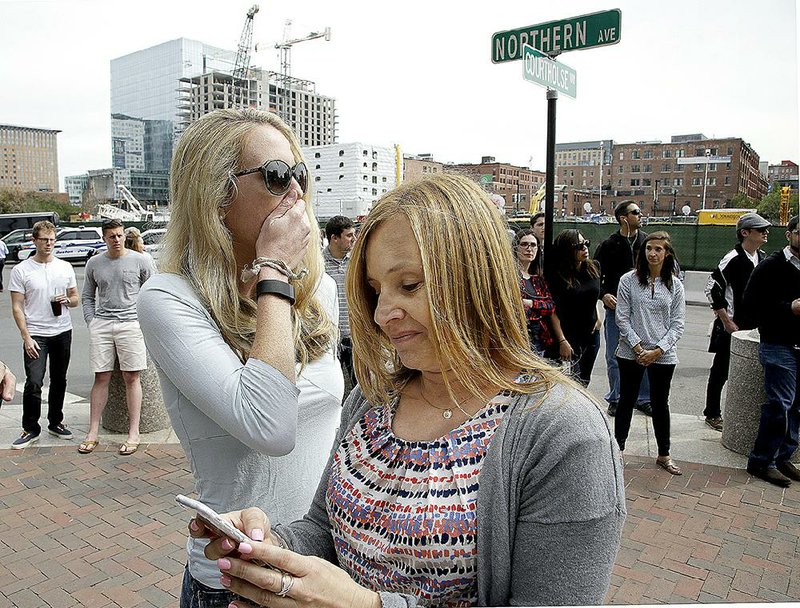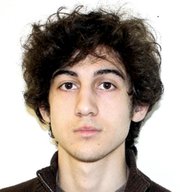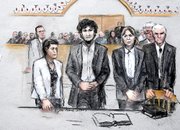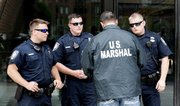BOSTON -- A jury sentenced Dzhokhar Tsarnaev to death Friday for the Boston Marathon bombing, sweeping aside pleas that he was just a "kid" who fell under the influence of his fanatical older brother.
Tsarnaev, 21, stood with his hands folded, his head slightly bowed, upon learning his fate, sealed after 14 hours of deliberations over three days. It was the most closely watched terrorism trial in the U.S. since the Oklahoma City bombing case two decades ago.
The decision sets the stage for what could be the nation's first execution of a terrorist in the post-9/11 era, though the case is likely to go through years of appeals. The execution would be carried out by lethal injection.
"Now he will go away and we will be able to move on. Justice. In his own words, 'an eye for an eye,'" said bombing victim Sydney Corcoran, who nearly bled to death and whose mother lost both legs.
Karen Brassard, who suffered shrapnel wounds on her legs, said: "We can breathe again."
Three people were killed and more than 260 wounded when Tsarnaev and his brother set off two shrapnel-packed pressure- cooker bombs near the finish line of the race on April 15, 2013. The Tsarnaevs also shot a Massachusetts Institute of Technology police officer to death during their getaway.
The seven-woman, five-man federal jury had to be unanimous for Tsarnaev to get the death penalty. Otherwise, the former college student would have automatically received a sentence of life in prison with no chance of parole.
In weighing the arguments for and against death, the jurors decided among other things that Tsarnaev showed a lack of remorse. And they emphatically rejected the defense's central argument -- that he was led down the path to terrorism by his big brother.
"Today the jury has spoken. Dzhokhar Tsranaev will pay for his crimes with his life," said U.S. Attorney Carmen Ortiz.
Tsarnaev's father, Anzor Tsarnaev, reached by phone in the Russian region of Dagestan, let out a moan upon hearing the news and hung up. Tsarnaev's lawyers had no comment as they left the courtroom.
The attack and the ensuing manhunt paralyzed the city for days and cast a pall over the marathon that has yet to be lifted.
With Friday's decision, community leaders and others talked of closure, of relief, of resilience.
"Today, more than ever, we know that Boston is a city of hope, strength and resilience that can overcome any challenge," said Mayor Marty Walsh.
Tsarnaev was convicted last month of all 30 charges against him, including use of a weapon of mass destruction. Seventeen of those charges carried the possibility of a death sentence; ultimately, the jury gave him the death penalty on six of those counts.
When the jury returned at 3:10 p.m., the foreman passed an envelope to the judge. Jurors remained standing while the clerk read aloud the 24-page verdict form that they had filled out. It took him 20 minutes.
It was not clear until the end that the sentence was death, though all signs along the way pointed in that direction.
The speed with which the jury reached a decision surprised some, given that the jurors had to fill out a detailed, 24-page worksheet in which they tallied up the factors for and against the death penalty.
The possible aggravating factors included the cruelty of the crime, the killing of a child, the amount of carnage and lack of remorse. The possible mitigating factors included Tsarnaev's age, the influence of his brother, and his turbulent, dysfunctional family.
The jury agreed with the prosecution on 11 of the 12 aggravating factors cited. In weighing the mitigating factors, only three of the 12 jurors found Tsarnaev acted under the influence of his brother.
Tsarnaev did manage to escape a death sentence in the killing of the MIT officer, after prosecutors admitted they do not know which brother pulled the trigger.
Some legal specialists said the deliberation time was relatively quick in a case this complex.
Eric Freedman, a death-penalty specialist at Hofstra University Law School, said the relative speed of the verdict suggested two possible grounds for an all-but-certain appeal: "the failure to grant a change of venue, despite the overwhelming evidence the defense presented about community attitudes in Boston, and the failure to instruct the jury that if a single juror refused to vote for death, the result would be a life sentence."
But other lawyers said 14 hours was not speedy at all in a case like this, in which so much of the evidence weighed against the defendant, and they saw no serious grounds for appeal.
"I've seen juries return verdicts in 25 minutes if the evidence is strong," said Michael Kendall, a former federal prosecutor in Boston. "But rarely do you have a case like this -- a crime of such enormity to start with, plus a mountain of evidence and a defendant who is so unsympathetic."
Defense: led astray
Tsarnaev's chief lawyer, death-penalty specialist Judy Clarke, admitted at the very start of the trial that Tsarnaev participated in the bombings, telling the jury: "It was him."
Until she stepped in to help defend Tsarnaev, Clarke had never lost a client to death row, even after representing some of the nation's most notorious clients, including Unabomber Theodore Kaczynski and Jared Loughner, who shot Arizona Rep. Gabrielle Giffords and killed others at a 2011 public gathering in Tucson.
The defense argued that Dzhokhar was an impressionable 19-year-old led astray by his volatile and domineering 26-year-old brother, Tamerlan, who was portrayed as the mastermind of the plot to punish the U.S. for its wars in Muslim countries.
Tamerlan died days after the bombing when he was shot by police and run over by Dzhokhar during a chaotic getaway attempt.
Prosecutors depicted Dzhokhar Tsarnaev as an equal partner in the attack, saying he planted a bomb on the pavement behind a group of children, killing an 8-year-old boy.
To drive home their point, prosecutors cited the message he scrawled in the dry-docked boat where he was captured: "Stop killing our innocent people and we will stop." And they opened their case in the penalty phase with a startling photo of him giving the finger to a security camera in his jail cell months after his arrest.
"This is Dzhokhar Tsarnaev --unconcerned, unrepentant and unchanged," prosecutor Nadine Pellegrin said.
The jurors also heard testimony from numerous bombing survivors who described seeing their legs blown off or watching someone next to them die.
Killed in the bombing were Lingzi Lu, a 23-year-old Boston University graduate student from China; Krystle Campbell, a 29-year-old restaurant manager; and 8-year-old Martin Richard, who had gone to watch the marathon with his family. Massachusetts Institute of Technology police officer Sean Collier was gunned down in his cruiser days later. Seventeen people lost legs in the bombings.
Tsarnaev did not take the stand at his trial. In his only flash of emotion during the months-long case, he cried when his Russian aunt took the stand.
The only evidence of any remorse on his part in the two years since the attack came from the defense's final witness, Sister Helen Prejean, a Roman Catholic nun and staunch death-penalty opponent portrayed in the movie Dead Man Walking.
She quoted Tsarnaev as saying of the victims: "No one deserves to suffer like they did."
Only two of the 12 jurors said on the verdict form that they believed he had expressed sorrow and remorse for his actions.
Tsarnaev's lawyers also called teachers, friends and Russian relatives who described him as a sweet and kind boy who cried during The Lion King. The defense called him a "good kid."
The defense argued that sparing his life and sending him instead to the high-security Supermax federal prison in Colorado would be a harsh punishment and would help the victims move on with their lives without having to read about years of death-row appeals.
Massachusetts is a liberal, staunchly anti-death penalty state that hasn't executed anyone since 1947, and there were fears that a death sentence for Tsarnaev would only satisfy his desire for martyrdom. Even the grieving parents of the 8-year-old victim publicly urged prosecutors to drop their push for death.
Former Maryland Gov. Martin O'Malley said he respects the verdict of the jury but remained opposed to the death penalty and considers it "ineffective."
O'Malley, a potential Democratic presidential candidate, said the death penalty's appeals process is "expensive and cruel to the surviving family members."
But others argued that if capital punishment is to be reserved for "the worst of the worst," Tsarnaev qualifies.
"The ultimate penalty is a fitting punishment for this horrific crime and we hope that the completion of this prosecution will bring some measure of closure to the victims and their families," said U.S. Attorney General Loretta Lynch.
The death sentence marks a singular achievement for federal prosecutors, who have repeatedly failed in recent years to persuade jurors to impose the ultimate punishment in international-related U.S. terrorism trials, including the first World Trade Center bombing in New York and the case against Zacarias Moussaoui, alleged to be the 20th Sept. 11 hijacker.
If the penalty is carried out, Tsarnaev will be the fourth person put to death in a federal case since the death penalty was reinstated in the U.S. in 1988. He would follow Oklahoma City bomber Timothy McVeigh, a murderous drug dealer and a man who killed a female U.S. soldier, all of whom were executed by lethal injection at the federal death chamber in Terre Haute, Ind.
U.S. District Judge George O'Toole Jr. will formally impose the sentence at a later date during a hearing in which bombing victims will be allowed to speak. Tsarnaev also will be given the opportunity to address the court.
Bombing survivor Melida Arrendondo said the verdict didn't bring her satisfaction. She wouldn't say whether she wanted Tsarnaev to get a life sentence but said she dreads the appeals process ahead.
"This seems like another burden that will drag on," she said.
Information for this article was contributed by Denise Lavoie and Ken Thomas of The Associated Press; by Katharine Q. Seelye and Alexandra Odynova of The New York Times; by Richard A. Serrano of Tribune News Service; and by Janelle Lawrence and Erik Larson of Bloomberg News.




